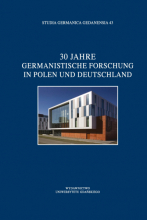Reportive sollen+infinitive in interrogative sentences
DOI:
https://doi.org/10.26881/sgg.2020.43.13Słowa kluczowe:
sollen infinitive, conversational implicature, interrogative sentence type, rhetorical questionsAbstrakt
In this paper, the reportive construction sollen+infinitive is treated as merely agnostic, with the negative epistemic component emerging qua conversational implicature. The paper aims to test whether the interrogative sentence type can be seen as a contextual trigger for this implicature. It concludes that the negative epistemic implicature can be triggered or strengthened by proper questions and mirative questions, but not by rhetorical or unresolvable questions as defined by Celle (2018).
Downloads
Bibliografia
Aikhenvald, Alexandra Y. (2003): Evidentiality in typological perspective. In: Aikhenvald, Alexandra Y. / R.M.W. Dixon (eds.): Studies in evidentiality. Amsterdam / Philadelphia: Benjamins, 1–32.
AnderBois, Scott (2014): On the exceptional status of reportative evidentials. In: Proceedings of SALT. 24, 234–254.
Celle, Agnès (2018): Questions as indirect speech acts in surprise contexts. In: Ayoun, Dalila / Agnès Celle / Laure Lansari (eds.): Tense, Aspect, Modality, and Evidentiality: Crosslinguistic perspectives. Amsterdam / Philadelphia: Benjamins, 213–238.
DeLancey, Scott (2001): The mirative and evidentiality. In: Journal of Pragmatics. 33, 369–382.
Diewald, Gabriele (1999): Die Modalverben im Deutschen. Grammatikalisierung und Polyfunktionalität. Tübingen: Niemeyer.
Duden (1973) = Grebe, Paul et al. (1973): Duden – Grammatik der deutschen Gegenwartssprache. Mannheim / Wien / Zürich: Bibliographisches Institut.
Duden (2016) = Wöllstein, Angelika et al. (2016): Duden – Die Grammatik. Berlin: Bibliographisches Institut.
Fritz, Thomas A. (2000): Wahr-Sagen: Futur, Modalität und Sprecherbezug. Hamburg: Buske.
Hamblin, Charles L. (1973): Questions in Montague English. In: Foundations of Language 10: 41–53.
Helbig, Gerhard (2001): Gabriele Diewald: Die Modalverben im Deutschen. Grammatikalisierung und Polyfunktionalität [Rezension]. In: Deutsch als Fremdsprache 38/3, 182–183.
Hengeveld, Kees / Olbertz, Hella (2012): Didn’t you know? Mirativity does exist! In: Linguistic Typology 16, 487–503.
Higginbotham, James / May, Robert (1981): Questions, quantifiers, and crossing. In: The Linguistic Review 1, 41–80.
Holvoet, Axel (2012): Polish mieć and the semantic map of interpretive deontics. In: Zeitschrift für Slawistik 2012(2), 146–179.
Hundt, Markus (2003): Zum Verhältnis von epistemischer und nicht-epistemischer Modalität im Deutschen. Forschungspositionen und Vorschlag zur Neuorientierung. In: Zeitschrift für germanistische Linguistik 31, 343–381.
Kotin, Michail L. (2011): Ik gihôrta đat seggen… Modalität, Evidentialität, Sprachwandel und das Problem der grammatischen Kategorisierung. In: Diewald, Gabriele / Elena Smirnova (eds.): Modalität und Evidentialität / Modality and Evidentiality. Trier: WVT, 35–48.
Kotin, Michail L. / Schönherr, Monika (2012): Zum Verhältnis von Epistemizität und Evidentialität im Deutschen aus diachroner und typologischer Sicht. In: Zeitschrift für deutsche Philologie 131/3: 393–416.
Karttunen, Lauri (1977): Syntax and semantics of questions. In: Linguistics and Philosophy 1: 3–44.
Leiss, Elisabeth (2009): Drei Spielarten der Epistemizität, drei Spielarten der Evidentialität und drei Spielarten des Wissens. In: Abraham, Werner / Elisabeth Leiss (eds.): Modalität. Epistemik und Evidentialität bei Modalverb, Adverb, Modalpartikel und Modus. Tübingen: Stauffenburg, 3–24.
Letnes, Ole (2008): Quotatives sollen und Sprecherhaltung. In: Letnes, Ole / Eva Maagerø / Heinz Vater (eds.): Modalität und Grammatikalisierung. Trier: WVT, 23–37.
Levinson, S.C. (2000). Presumptive meanings. The theory of generalized conversational implicature. Cambridge, MA.: MIT Press.
Meibauer, Jörg (1986): Rhetorische Fragen. Tübingen: Niemeyer.
Meibauer, Jörg (2008): Pragmatik: Eine Einführung. Tübingen: Stauffenburg.
Mortelmans, Tanja (2000): On the evidential and the epistemic use of the German modals müssen and sollen. In: van der Auwera, Johan (ed.): Modal verbs in Germanic and Romance languages. Amsterdam: Benjamins, 131–148.
Mortelmans, Tanja (2009): Erscheinungsformen der indirekten Rede im Niederländischen und Deutschen zou, soll(te) – und der Konjunktiv I. In: Abraham, Werner / Elisabeth Leiss (eds.): Modalität. Epistemik und Evidentialität bei Modalverb, Adverb, Modalpartikel und Modus. Tübingen: Stauffenburg, 171–187.
Mortelmans, Tanja / Stathi, Katerina (forthcoming). German. In: Wiemer, Björn / Juana I. Marín Arrese (eds.): The Expression of Evidentiality and Modality in English and other European Languages: Crosslinguistic Perspectives.
Öhlschläger, Günther (1989): Zur Syntax und Semantik der Modalverben des Deutschen. Tübingen: Niemeyer.
Plungian, Vladimir (2001): The place of evidentiality within the universal grammatical space. In: Journal of Pragmatics 33, 349–357.
Reis, Marga (1992): Zur Grammatik und Pragmatik von Echo-w-Fragen. In: Rosengren, Inger (ed.): Satz und Illokution, Bd. 1. Tübingen: Niemeyer, 213–261.
Rohde, Hannah (2006): Rhetorical questions as redundant interrogatives. In: San Diego Linguistics Papers 2, 134–168.
Schenner, Mathias (2008a): Double Face Evidentials in German: Reportative ‘sollen’ and ‘wollen’ in Embedded Contexts. In: Grønn, Atle (ed.): Proceedings of SuB12. Oslo: ILOS, 552–566.
Schenner, Mathias (2008b): Semantics of evidentials: German reportative modals. In: Proceedings of ConSOLE XVI, 179–198.
Vanderbiesen, Jeroen (2015): The Grounding Functions of German Reportives and Quotatives. In: Studies van de BKL = Travaux du CBL = Papers of the LSB 9, 16–39.
Vanderbiesen, Jeroen (2016): Mixed viewpoints and quotative-reportive cline in German; reported speech and reportive evidentiality. In: Dancygier, Barbara / Wei-lun Lu / Arie Verhagen (eds.): Viewpoint and the Fabric of Meaning. Form and Use of Viewpoint Tools across Languages and Modalities. Berlin: Mouton de Gruyter, 41–92.
Vanderbiesen, Jeroen (2018): Reportive sollen in an Exclusively Functional View of Evidentiality. In: Foolen, Ad / Helen de Hoop / Gijs Mulders (eds.): Evidence for evidentiality. Amsterdam / Philadelphia: Benjamins, 173–198.
Weiss, Daniel (2009): Mögliche Argumentationen zum Nachweis von Calques am Beispiel der polnischen Modalverben. In: Scholze, Lenka / Björn Wiemer (eds.): Von Zuständen, Dynamik und Veränderung bei Pygmäen und Giganten. Festschrift für Walter Breu zu seinem 60. Geburtstag. Bochum: Brockmeyer, 129–153.
Wiemer, Björn / Socka, Anna (forthcoming): Polish. In: Wiemer, Björn / Juana I. Marín Arrese (eds.): The Expression of Evidentiality and Modality in English and other European Languages: Crosslinguistic perspectives.
Wunderlich, Dieter (1981): Modalverben im Diskurs und im System. In: Rosengren, Inger (ed.): Sprache und Pragmatik: Lunder Symposium 1980. Lund: Gleerup, 11–53.
Pobrania
Opublikowane
Jak cytować
Numer
Dział
Licencja

Utwór dostępny jest na licencji Creative Commons Uznanie autorstwa – Użycie niekomercyjne – Bez utworów zależnych 4.0 Międzynarodowe.
Copyright by Instytut Filologii Germańskiej, Wydawnictwo Uniwersytetu Gdańskiego.

 Uniwersyteckie Czasopisma Naukowe
Uniwersyteckie Czasopisma Naukowe




